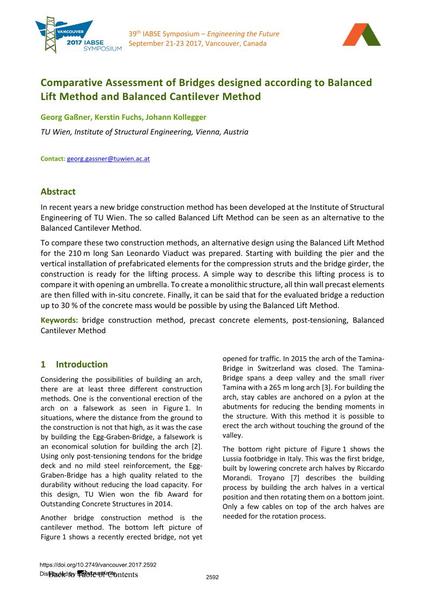Comparative Assessment of Bridges designed according to Balanced Lift Method and Balanced Cantilever Method

|
|
|||||||||||
Bibliografische Angaben
| Autor(en): |
Georg Gaßner
(TU Wien, Institute of Structural Engineering, Vienna, Austria)
Kerstin Fuchs (TU Wien, Institute of Structural Engineering, Vienna, Austria) Johann Kollegger (TU Wien, Institute of Structural Engineering, Vienna, Austria) |
||||
|---|---|---|---|---|---|
| Medium: | Tagungsbeitrag | ||||
| Sprache(n): | Englisch | ||||
| Tagung: | IABSE Symposium: Engineering the Future, Vancouver, Canada, 21-23 September 2017 | ||||
| Veröffentlicht in: | IABSE Symposium Vancouver 2017 | ||||
|
|||||
| Seite(n): | 2592-2598 | ||||
| Anzahl der Seiten (im PDF): | 7 | ||||
| Jahr: | 2017 | ||||
| DOI: | 10.2749/vancouver.2017.2592 | ||||
| Abstrakt: |
In recent years a new bridge construction method has been developed at the Institute of Structural Engineering of TU Wien. The so called Balanced Lift Method can be seen as an alternative to the Balanced Cantilever Method. To compare these two construction methods, an alternative design using the Balanced Lift Method for the 210 m long San Leonardo Viaduct was prepared. Starting with building the pier and the vertical installation of prefabricated elements for the compression struts and the bridge girder, the construction is ready for the lifting process. A simple way to describe this lifting process is to compare it with opening an umbrella. To create a monolithic structure, all thin wall precast elements are then filled with in-situ concrete. Finally, it can be said that for the evaluated bridge a reduction up to 30 % of the concrete mass would be possible by using the Balanced Lift Method. |
||||
| Stichwörter: |
Freivorbau Brückenbauverfahren
|
||||

